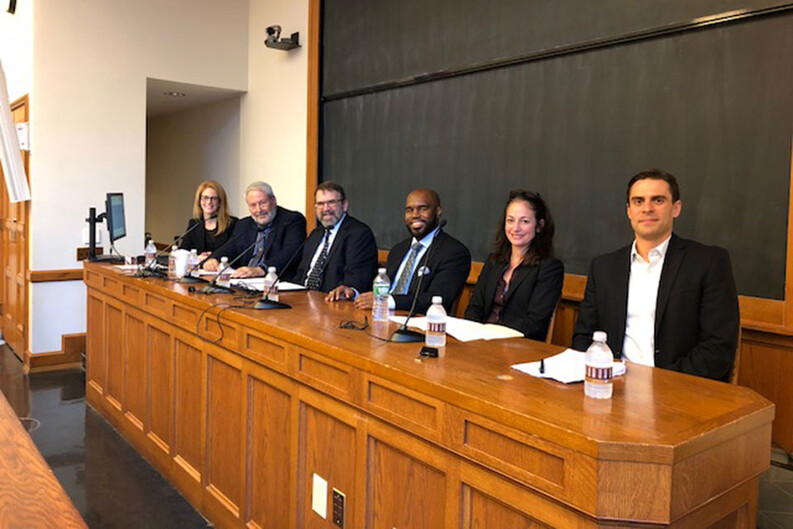Panel Discusses Marijuana Legalization

On November 2, 2017, the Solomon Center on Health Law and Policy and the Center for the Study of Corporate Law4 co-sponsored a panel titled “Marijuana Legalization: Impetus and Implications” to discuss the impact of state-level cannabis legalization and the challenges of building and regulating the businesses seeking to capitalize on the growing market.
Dr. Malik Burnett, former Policy Manager at the Drug Policy Alliance, set the stage by laying out the complex interplay between state and federal law in the legalization movement. He began with the example of the District of Columbia’s legalization that emerged from a decriminalization campaign in response to racial disparities in possession arrests. Burnett then explained how each state that has legalized marijuana has established distinct regulatory oversight regimes, requiring businesses to structure themselves differently in each state. He also explained the conflict between state and federal law: while marijuana is “legal” in certain states, technically marijuana is a Schedule I drug that is illegal according to federal law.
Two private sector representatives expanded on the consequences of the conflict between state and federal law. Rob Rowe, Vice President & Associate Chief Counsel, Regulatory Compliance, at the American Bankers Association, explained that because state marijuana businesses are technically illegal under federal law, banks cannot process money from these business without engaging in money laundering that puts a bank’s charter at risk. Consequently, marijuana business owners are left unbanked and transacting with large amounts of cash, which results in a situation that is both administratively inefficient (e.g., states do not like to take tax payments in cash) and potentially dangerous (e.g., marijuana businesses can become targets for crimes such as armed robbery). Doug Fischer, Chief Legal Officer of the National Association of Cannabis Businesses, echoed concerns that regulatory holes create uncertainty that is harmful to businesses and the public. While the National Association of Cannabis Businesses is trying to fill some of these holes by creating industry norms, Fischer emphasized that it is difficult for norms to substitute for a comprehensive regulatory scheme. He raised the example of the use of pesticides in cannabis cultivation. For crops such as corn, the federal government specifies the types of pesticides that can be used; there is no such specification for cannabis.
Other panelists expressed caution about more widespread use of cannabis, which legalization might encourage. While reaffirming that marijuana prosecutions are not a priority for her office, Assistant U.S. Attorney Amy Brown noted that “making something legal doesn’t make it safe.” She used the opioid epidemic as an example, noting that many addictions started from the use of legally prescribed painkillers. Dr. Richard Compton, Director of the Office of Behavioral Safety Research for the National Highway Traffic Safety Administration, also expressed concerns about safety, given “clear evidence” that cannabis use has the potential to impair driving skills. He emphasized that the primary goal of his office has always been to improve traffic safety, and that many legal substances, including alcohol and prescription medications, may have detrimental effects on driving skills. Therefore, for Compton, the question is one of safe cannabis usage and how to address the numerous data deficiencies in attempting to determine the level of safe usage in a driving context.
The panel ended with a discussion of racial justice, prompted by a student asking whether these new businesses profiting from the legalization of cannabis are discussing ways to include communities of color who were disproportionately impacted when marijuana was universally categorized as an illegal drug. Fischer noted that some businesses are, in fact, discussing ways to integrate these communities into their business models, including hosting diversity fairs and critically evaluating hiring policies such as background checks, but acknowledged more can always be done. Burnett highlighted local initiatives to pursue racial justice in the industry such as Oakland’s equity licensing scheme, which guarantees a portion of licenses to community members harmed by cannabis prohibition.


